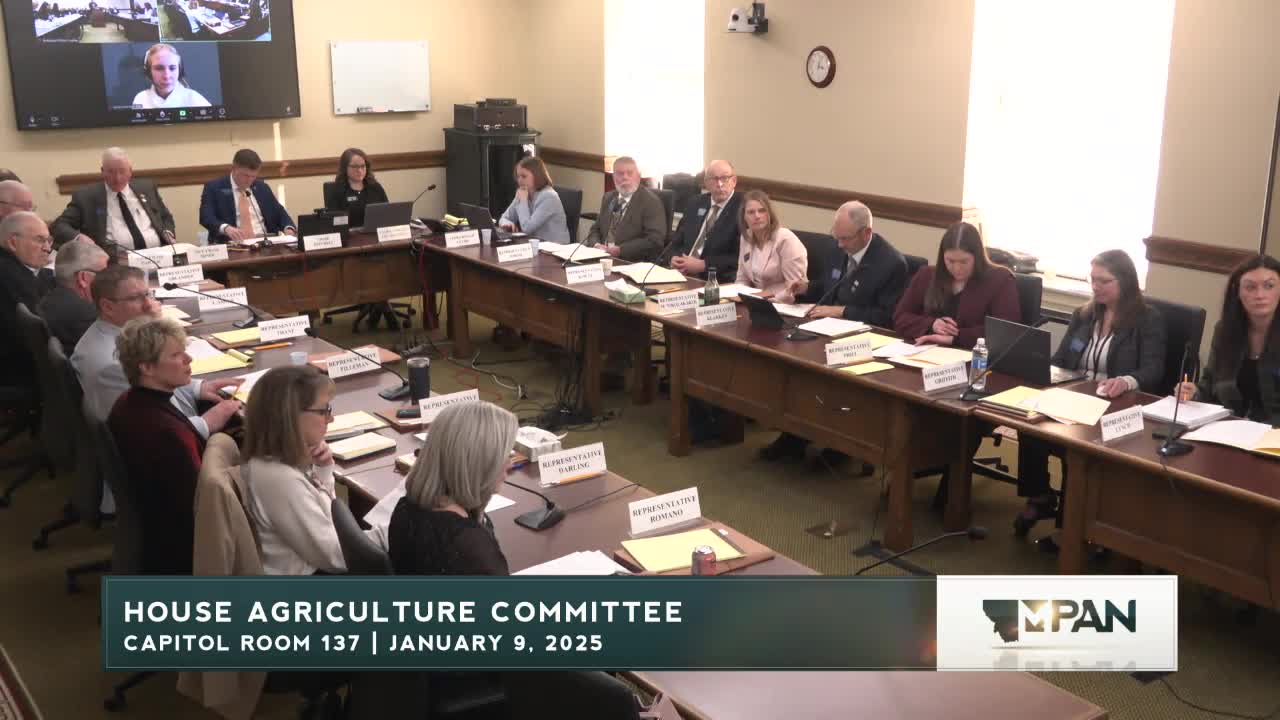House agriculture panel hears bill to create Montana Cattle Committee; debate centers on checkoff structure and oversight
Get AI-powered insights, summaries, and transcripts
Subscribe
Summary
At a House Agriculture Committee hearing, Representative Brandon Lear introduced House Bill 119, which would create a state-level Montana Cattle Committee and authorize a producer referendum on a $1-per-head assessment to fund marketing, research and education for Montana cattle and beef.
At a House Agriculture Committee hearing, Representative Brandon Lear introduced House Bill 119, which would create a state-level Montana Cattle Committee and authorize a producer referendum on a $1-per-head assessment to fund marketing, research and education for Montana cattle and beef.
Supporters — including cattle producers, commodity groups and the Montana Beef Council — said a state checkoff would let producers promote “Montana cattle” (not permitted under the national checkoff), fund production research and pool limited marketing resources. “This bill is going to create the Montana Cattle Committee,” Representative Brandon Lear said, adding the referendum would require “50% plus one” of voting producers to approve an assessment.
Proponents described start-up and referendum logistics and pledged producer funding for initial costs. Jim Steinbeisser, a rancher and former Montana Beef Council president, cited a Cornell study he said showed a $13.41 return for every $1 invested in the national checkoff and argued the state program would let Montana producers promote their product specifically. John Grande and other ranchers said pooled funds would help smaller operations that lack advertising and research budgets.
Opponents and some producer representatives urged changes or rejection of the bill as drafted, citing governance and fairness concerns. Eric Somerfeld of the Montana Farmers Union said the measure “creates a new tax and bureaucracy” and warned that 25%–40% of revenue could be consumed by administrative costs. He and others criticized the bill for (1) allowing the governor to appoint committee members rather than guaranteeing seats for key producer organizations, (2) lacking a minimum turnout threshold for the referendum, and (3) offering insufficient spending guardrails to prevent funds being used in ways some producers could oppose. “You could have 100 people vote, and if you get 51 of them say yes, it passes,” Somerfeld said.
Committee witnesses clarified implementation details but cautioned many specifics would be set in rulemaking if the bill progressed. Mike Honeycutt, executive officer at the Montana Department of Livestock, said the bill envisions collecting the assessment at the same change-of-ownership inspections now used to collect the federal beef checkoff: “Anytime a change of ownership inspection takes place, that’s where we collect the current federal checkoff…An animal could have checkoff dollars assessed on it multiple times within its lifetime.” Honeycutt also told members that back-office overhead and state program costs typically run about 25%–30% for programs administered within state government.
Questions from committee members focused on who would appoint the committee, how the referendum would be conducted and who could vote, how refunds would be processed, and whether funds could be restricted to Montana-specific promotion. Representative Lear and other supporters said the bill borrows language and structure from existing state commodity committees (wheat and barley, pulse crops, alfalfa seed) and that those committees are governor-appointed under current Montana code. Supporters also proposed two small technical amendments — replacing the word “affidavit” with “declaration” for voting eligibility paperwork and adjusting parental/guardian signature language for minors — which the sponsor characterized as friendly.
Several witnesses asked for additional changes: Ben Peterson and others urged explicit statutory safeguards about how funds may be spent and a higher voter turnout threshold for the referendum; Patrick Yawaki requested a Native American organization be included among the nominating groups for committee membership; and multiple opponents argued the program should be voluntary rather than mandatory.
The hearing closed without a committee vote. Representative Lear urged a “do pass” recommendation and the chair closed testimony; executive action on HB 119 was deferred because an amendment was not yet ready. Committee staff said executive action may be scheduled for the next week.
The bill’s next step would be committee executive action where members may propose, amend or vote on a committee recommendation before any House floor consideration.
